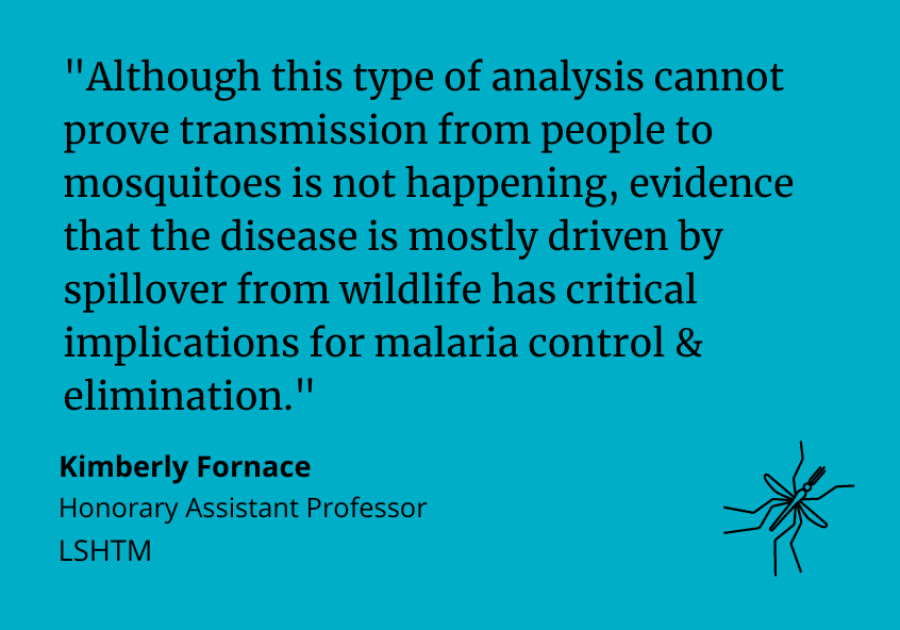Expert Comment – Increase in Plasmodium knowlesi malaria in Malaysia due to spillover from monkeys
1 June 2023 London School of Hygiene & Tropical Medicine London School of Hygiene & Tropical Medicine https://lshtm.ac.uk/themes/custom/lshtm/images/lshtm-logo-black.png
Kimberly Fornace quote card
Rising cases of human malaria in Malaysia caused by a major zoonotic parasite are likely driven by spillover from macaque monkeys and not direct human-to-human transmission, new research suggests.
According to a study published in Nature Communications, the observed increase in malaria cases in the country over the past decade caused by the parasite, Plasmodium knowlesi are due to infections from mosquitoes carrying the disease from macaques and not between humans.
The authors, including from the London School of Hygiene & Tropical Medicine (LSHTM), believe the findings could have wider policy implications, notably with regards to achieving universal malaria eradication.
P. knowlesi is a type of malaria normally carried by macaque monkeys which can cause severe and fatal malaria in humans. Since the initial discovery of a cluster of human P. knowlesi cases in Malaysian Borneo in the early 2000s, the incidence of P. knowlesi cases across Southeast Asia has increased alarmingly.
In this study, the team analysed over 30,000 malaria records between 2011 and 2021 in Malaysia, where P. knowlesi is the main cause of malaria in humans and where cases are rising. Malaysia was chosen because it has made significant progress toward malaria elimination in part due to an exceptionally strong surveillance system meaning detailed information is available for all cases.
Overall, the authors find no evidence for human-to-human transmission of the disease, concluding that new approaches are needed to control spillover risks.
Kimberly Fornace, lead study author and Sir Henry Dale Fellow at the University of Glasgow and National University of Singapore and Honorary Assistant Professor at LSHTM, said:
“The recent increase in P. knowlesi cases poses a major challenge to malaria control efforts across Southeast Asia. Despite having eliminated other types of human malaria, thousands of P. knowlesi cases are reported in Malaysia every year. This raises the question of whether this increase in cases is due to the P. knowlesi parasites adapting to spread between humans through mosquitoes or whether this increase in cases is still due to mosquitoes biting infected macaques and subsequently biting people.
“This analysis is the first to quantitatively examine surveillance data to assess evidence of human-mosquito-human transmission. Analysis of the spatial and temporal distribution of more than 23,000 reported P. knowlesi cases suggests that sustained human-mosquito-human transmission is unlikely and P. knowlesi risks are most likely to be zoonotic. Previous studies have shown a strong link between deforestation and P. knowlesi risks in people; environmental change is likely to be driving increased opportunities for disease spread between monkeys, mosquitoes and people.
“Although this type of analysis cannot prove transmission from people to mosquitoes is not happening, evidence that the disease is mostly driven by spillover from wildlife has critical implications for malaria control and elimination. Many of the existing malaria control measures, such as sleeping under bednets and frequent testing, are not effective with a wildlife host. New control measures are urgently needed to address this public health threat.”
Chris Drakeley, study author and Professor of Infection & Immunity at LSHTM said: “Our findings reinforce the fact that you can not necessarily apply the same rules for other ‘human’ malarias as you can to zoonotic malaria. A fundamental concern for those who govern malaria policy is whether zoonotic malaria should continue to be classified in the same way as human malarias. If so, these results suggest that many countries may not be able to achieve malaria elimination where a zoonotic malaria ‘reservoir’ (in Malaysia, wild macaques) remains, unless better guidelines are developed or current ones revised.”
If you enjoyed this article and would like to build a career in global health, we offer a range of MSc programmes covering health and data, infectious and tropical diseases, population health, and public health and policy.
Available on campus or online, including flexible study that works around your work and home life, be part of a global community at the UK's no.1 public health university.